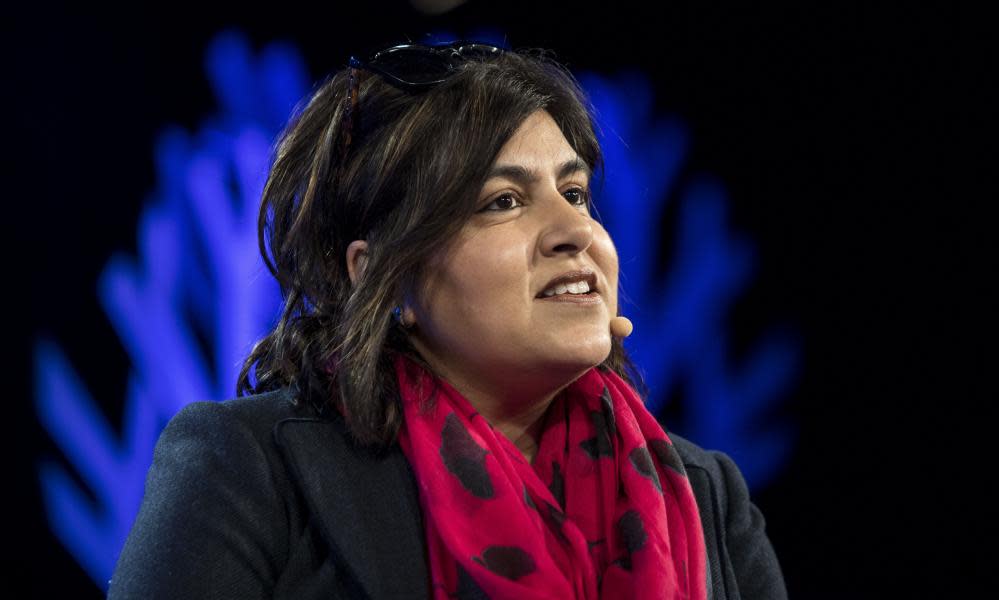Sayeeda Warsi: UK policy on radicalisation 'has been flawed for years'

The British government’s decision making when it comes to catching homegrown radicals has been flawed for years, according to Sayeeda Warsi, who has said Britain “cannot afford to have sloppy, lazy, ideologically driven decision making” on national security.
Speaking at Hay literary festival on Monday, Lady Warsi – the Conservative peer and first Muslim in a British cabinet – said government policy was currently too focused on ideology as the sole cause of radicalisation, and not on other factors, including upbringing and drug and gang culture.
“We say it is all ideology,” she told the audience. “Ideology is a part of it, but it is not all ideology. And the concern that I have in terms of government decision making is if we’re genuinely wanting to deal with this – which we are – then we have to go back to seeing what the evidence says ...
“We cannot afford to have sloppy, lazy, ideologically driven decision making in this area of policy. It is about our national security.
“We need to go back to statistics, to profiles of these individuals – and I just don’t see that happening. I really worry that government decision making in this area has been flawed for a number of years. And that leads to a sense of ‘we’re not doing enough, we need to do more, Muslims need to do more’.”
After the attack on the Ariana Grande concert in Manchester last week, which killed 22 and left more than 50 people injured, the government is facing questions over how intelligence services failed to monitor the movements of the attacker, Salman Abedi, despite multiple residents alleging they had warned UK authorities about his beliefs.
Warsi, who was born and raised in Dewsbury, Yorkshire, noted that 7/7 suicide bomber Mohammad Sidique Khan grew up just streets away from her family home. “We went to the same schools, the same mosques, had the same friends, had a similar experience,” she said. “Why does one person end up becoming the first Muslim in the British cabinet and the other becomes Britain’s first suicide bomber? We have to track that and find detailed evidence-based answers to that, if we’re genuinely going to tackle this.”
Also speaking at Hay was Tariq Ramadan, a professor of Islamic studies, who said Muslims had a “moral duty” to condemn terrorist attacks. “If someone is saying, ‘I am doing this in the name of religion,’ and you are a Muslim or a Christian or a Jew or a Buddhist, you have a moral responsibility to say, ‘No, not in my name, that is not me.’ You have a moral duty.”
However, he also noted that western societies continued to demand that the Muslim population repeatedly condemn the same acts. “The problem we have in the west is that we keep asking, ‘You have to condemn, you have to condemn.’ Well, this is is the fiftieth time I am condemning it, so please listen,” he said. “We are responding. What would be good is for our fellow citizens and our politicians to listen to us.”
At her event, Warsi, who was minister of state for faith and communities until 2014, also said she hoped British Muslims would push for the phasing out of wearing burqas in Britain, calling the head-to-toe garments “not the best manifestation of British Islam”.
“I want British Muslims to lead that charge … but I don’t want it to be done with a government diktat of what women can or can’t wear, because at what point do you start to draw the lines?” she said. “What else will offend us that we don’t want people to go around wearing? There are people in conservative societies across this country who would be offended at what certain girls are wearing out on a Friday night. What are we going to do, ban that next because we’re offended by it?”
She also revealed that the “jury was still out” on whether she supported faith-segregated schools: “I was a huge supporter of faith schools but ... I’m not convinced bringing up kids in a single-faith school is good for them.”

 Yahoo News
Yahoo News 
